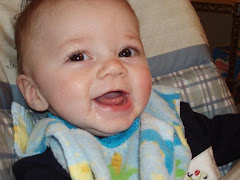The Baby Whisperer, by Tracy Hogg, was definitely an interesting read. Was it a
good read? Not necessarily...this book was somewhat contradictary to my own personal child-rearing beliefs. Because of this, I found the book, at times, to be a little hard to swallow, however, some of the information was factual and therefore helpful.
The author of this book is a registered nurse, midwife, and newborn and postpartum caregiver from England with over 20 years of experience, who claims an innate ability to comprehend the often difficult to read language of babies. She believes that "Every baby is a person who has language, feelings, and a unique personality - and, therefore, deserves respect." While I believe this statement to be "spot on", I take issue with other aspects of her philosophy. For example, she whole-heartedly disagrees with feeding on demand and goes so far as to have a feeding schedule set into place from day two of a newborns life. I disagree with this. She also has some interesting things to say about breastfeeding, (as in "not good" things) which I
definitely disagree with.
Hogg believes in scheduling most, if not all, aspects of baby's day. She calls it her E.A.S.Y. plan. E.A.S.Y. is an acronym for Eating, Activity, Sleep, and You Time. In her section on the "E" (eating) she goes into detail about the pros and cons of breastfeeding. This chapter, as I said before, I took particular issue with, because she puts breastfeeding into an almost completely negative light. In all honesty, if I had read this book prior to breastfeeding, I would have definitely decided against it.
The author claims that "not everyone can or should do it" and that while breastfeeding is best "we mustn't go overboard". She speaks of how breastfeeding moms typically keep 5 to 10 pounds of pregnancy weight while nursing and how this could adversely affect their body image. This may be true, (and I'm actually sporting those 5-10 extra pounds of cushion right now) but is it really relevant when your child's health is concerned? She puts emphasis on how much it hurts to breastfeed and how it isn't nearly as easy as most mothers think it will be. This may be true as well, but she makes absolutely no mention of how quickly this hard time passes. Within a month most mothers are well-adjusted and become champion breastfeeders! Most women actually come to enjoy it - I know I did!
Hogg also says that just because studies show that breastfeeding can help prevent certain types of cancer in the mother and, in the nursing infant, ear infections and respiratory diseases, that this is only statistical evidence and by no means indicates that you or your child
won't contract these illnesses. This is accurate - BUT it certainly doesn't mean that breastmilk doesn't provide protection! Hogg even goes so far as to actually mention a 1999 article in the
Journal of Nutrition that describes the possibility of changing the genetics of cows to produce human breastmilk...WHAT?!? Just because it
might be possible, doesn't mean it should be done! Yikes.
Despite all the problems I have with the content of this book, I did learn two things: 1) Sometimes I think the baby is hungry, when really the baby is TIRED. and 2) put baby down for a nap after 2 yawns to preven excessive fussiness. In the section where Hogg describes understanding baby language, she admits that most mothers mistake the tired cry for hunger. She advocates putting babies on eating schedules for this very reason - so you don't mistake their cries. I disagree with that point, but I did learn from the advice on getting baby to nap. This has actually helped me immensely, which I am grateful for.
Other aspects of the book include a table describing different kinds of cries and body language and what they mean. I found this section to be self-explanatory because who can't tell when their baby is experiencing "discomfort" such as gas or a bowel movement? Hogg also mentions scheduling "You Time" by having a loved one or nanny come in for 2 or 3 hours a day to babysit while you nap or do other girly things. This is a neat idea in theory - but most of us don't have the extra money lying around to take time off to sit for someone 3 hours a day or to hire a nanny for 3 hours a day.
So, while I found this book to be interesting, I do not recommend it as a useful baby tool. And I strongly advice against reading this book if you are currently deciding whether or not to breasfeed! As I previously mentioned, had I done this I would have most definitely decided against breastfeeding and that would have been the WRONG decision. Thank goodness I used my intellect and will-power to make and stick with my decision to nurse.












